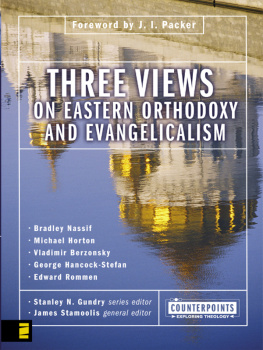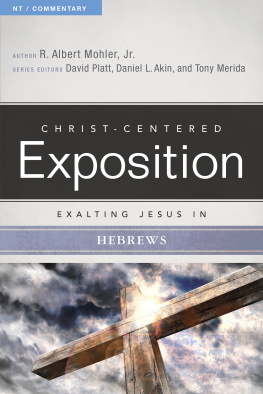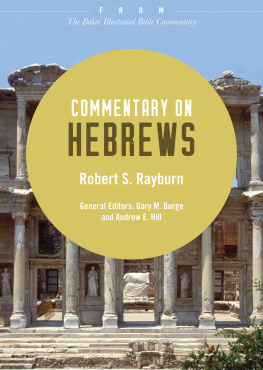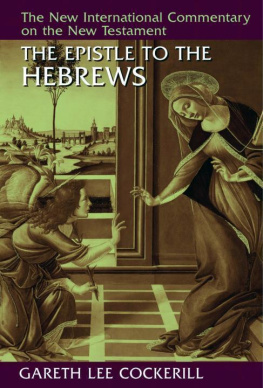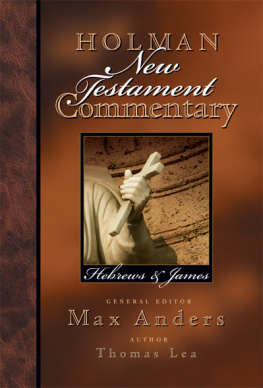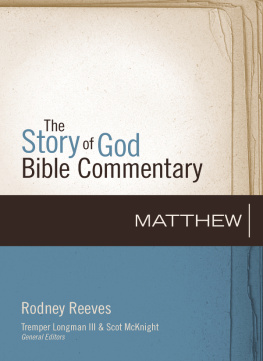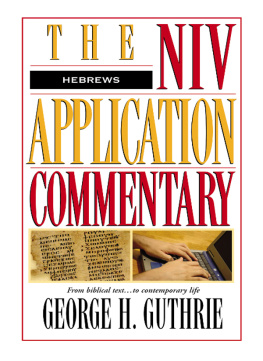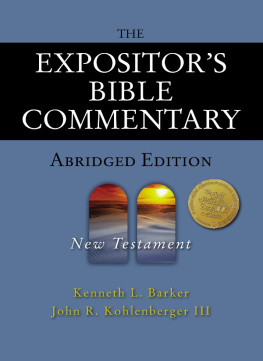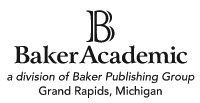My sincere thanks to Shirley Decker-Lucke, Editorial Director at Hendrickson Publishers, for accepting this exposition of the New Testament for publication; to Mark House, Phil Frank, and others for their work there on the publication; and to the Baker Academic team for their work on this reprint. My brother Stan Gundry, whose contributions to Christian publishing are deservedly well-known, encouraged me to write the exposition. Connie Gundry Tappy copyedited the manuscript. Her copyediting included not only the correction of errors and the refinement of style, but also a host of interpretive improvements and scriptural cross-references arising out of her comprehensive knowledge of the Bible. To her, my daughter as well as my copyeditor, I affectionately dedicate this volume.
Robert H. Gundry
Westmont College
Santa Barbara, California
Introduction
Dear reader,
Here you have part of a commentary on the whole New Testament, published by Baker Academic both in hardback and as an ebook. The electronic version has been broken into segments for your convenience and affordability, though if you like what you find here you may want to consider the whole at a proportionately lower cost. Whether in whole or in part, the e-version puts my comments at your fingertips on your easily portable Kindle, iPad, smartphone, or similar device.
Ive written this commentary especially for busy people like youlay people with jobs and families that take up a lot of time, Bible study leaders, pastors, and all who take the New Testament seriouslythat is, people who time-wise and perhaps money-wise cant afford the luxury of numerous heavyweight, technical commentaries on the individual books making up the section of the Bible we call the New Testament. So technical questions are avoided almost entirely, and the commentary concentrates on what will prove useful for understanding the scriptural text as a basis for your personal life as a Christian, for discussion with others, and for teaching and preaching.
Group discussion, teaching, and preaching all involve speaking aloud, of course, and when the New Testament was written, even private reading was done aloud. Moreover, most authors dictated their material to a writing secretary, and books were ordinarily read aloud to an audience. In this commentary, then, Ive avoided almost all abbreviations (which dont come through as such in oral speech) and have freely used contractions that characterize speaking (well, youre, theyve, and so on). To indicate emphasis in oral speech, italics also occur fairly often.
Youll mostly have to make your own practical and devotional applications of the scriptural text. But such applications shouldnt disregard or violate the meanings intended by the Scriptures divinely inspired authors and should draw on the richness of those meanings. So Ive interpreted them in detail. Bold print indicates the text being interpreted. Translations of the original Greek are my own. Because of the interpretations close attention to detail, my translations usually, though not always, gravitate to the literal and sometimes produce run-on sentences and other nonstandard, convoluted, and even highly unnatural English. Square brackets enclose intervening clarifications, however, plus words in English that dont correspond to words in the Greek text but do need supplying to make good sense. (As a language, Greek has a much greater tendency than English does to omit words meant to be supplied mentally.) Seemingly odd word-choices in a translation get justified in the following comments. It needs to be said as well that the very awkwardness of a literal translation often highlights features of the scriptural text obscured, eclipsed, or even contradicted by loose translations and paraphrases.
Literal translation also produces some politically incorrect English. Though brothers often includes sisters, for example, sisters doesnt include brothers. Similarly, masculine pronouns may include females as well as males, but not vice versa. These pronouns, brothers, and other masculine expressions that on occasion are gender-inclusive correspond to the original, however, and help give a linguistic feel for the male-dominated culture in which the New Testament originated and which its language reflects. Preachers, Bible study leaders, and others should make whatever adjustments they think necessary for contemporary audiences but should not garble the texts intended meaning.
Out of respect for your abilities so far as English is concerned, Ive not dumbed down the vocabulary used in translations and interpretations. Like the translations, interpretations are my own. Rather than reading straight through, many of you may consult the interpretation of an individual passage now and then. So Ive had to engage in a certain amount of repetition. To offset the repetition and keep the material in bounds, I rarely discuss others interpretations. But Ive not neglected to canvass them in my research.
On the theological front, the commentary is unabashedly evangelical, so that my prayers accompany this volume in support of all you who strive for faithfulness to the New Testament as the word of God.
Robert Gundry
Hebrews
Hebrews was written anonymously, and neither its contents and style nor early church tradition enables us to guess with confidence who may have written it. The address and greeting that usually introduce an ancient letter are missing from Hebrews, but it closes like an ancient letter (13:1825). Apart from the traditional title, To the Hebrews, several factors favor an original audience consisting at least for the most part of Jewish Christians: (1) warnings not to apostatize as an early generation of Jews did; (2) a presupposition of the recipients knowledge of Jewish ritual; and (3) constant appeal to the Old Testament. Whatever his own identity, the author portrays Jesus Christ distinctively as a high priest who, having offered none other than himself as a completely sufficient sacrifice for sins, now ministers in the heavenly sanctuary. The purpose of this portrayal, which emphasizes his superiority to every aspect and hero of Old Testament religion, is to ensure that the letters recipients stick true to their Christian faith.




